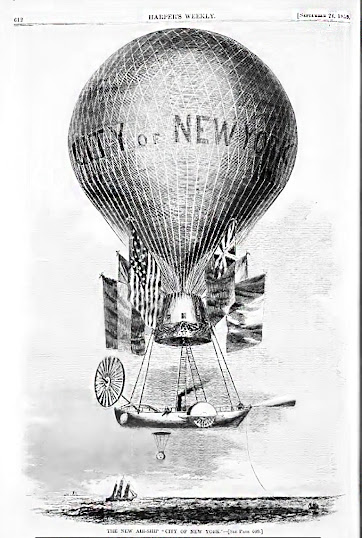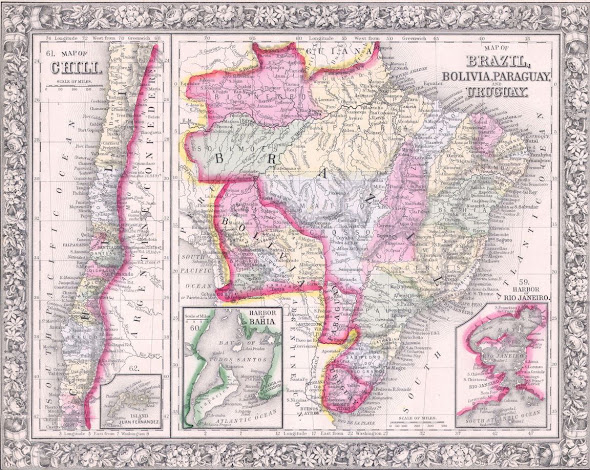We Can Never Know the Complete Past
What I Have Learned Writing This Blog
A little more than a year ago, while writing a magazine article on
a different topic, I stumbled upon magazine and newspaper articles about the
United States’ close call with war in a remote part of South America in 1858.
Big news at the time; forgotten today.
“Dumpster diving” in the Library of Congress’ massive newspaper and periodical collection turned up all sorts of nuggets of forgotten history. In fact, I could hardly open more than a few newspapers while looking for one obscure topic without finding several other mysteries.
“Dumpster diving” in the Library of Congress’ massive newspaper and periodical collection turned up all sorts of nuggets of forgotten history. In fact, I could hardly open more than a few newspapers while looking for one obscure topic without finding several other mysteries.
There was just as much going on in the world between 1848 and 1868 as there was in the world between 1996 and 2016. Yet, to the modern mind, there is practically nothing going on between 1848-1868 except the Civil War, and perhaps people might remember the 1849 Gold Rush and Commodore Perry opening Japan to trade.
I have learned how difficult it is for us in the present to truly know the past. Media then—as now—was full of references to common culture we no longer understand. If the world survives another 160 or so years, I am sure the same will be true of future historical adventurers. “Historical adventuring” is an apt term for what I experience. I know how battles or grand enterprises turn out, still, it is a thrill to read about them in terms contemporaneous to them, not us.
The other thing I have learned is we cannot truly understand the past without learning vast amounts of trivia and terms people of the past took for granted others understood. For example, the average person of 1848 knew the difference between “winter pressed whale oil” and “summer pressed whale oil” and why the summer pressed was cheaper. A casual reference in a California newspaper of 1866 to the appointment of some obscure politician “notorious for his contribution of the buckhorn chair to the president.” People understood Lincoln’s meaning when he was quoted as saying, “I’d rather have swallowed my buckhorn chair than appoint him.” As a modern point of reference consider “Watergate” and when did we start adding “gate” to subsequent political scandals. The terms “9-11” and “Pearl Harbor” may be equally obscure to the future 160 years hence as they would be to people 160 years ago. For one thing, people of the 1850s did not express dates in number terms except days of the month; for another, Pearl Harbor simply referred to the obnoxious descendants in the Sandwich Islands (recently renamed Hawaii) who had been agitating for decades to be annexed to the United States so the locals could sell duty free sugar to Oregon and California. Otherwise, Hawaii was mainly known as a stop for Nantucket whalers.
What we may view as important historical landmarks were nearly unnoticed by people in the past. A magazine survey of readers in the 1850s asking what the most significant new invention in their lifetime was returned the result “the match stick,” not the telegraph or the steam engine. The match stick democratized fire in an overwhelmingly rural economy and culture in which keeping a fire going was a major preoccupation and starting a new fire in a new place was often difficult. Matches made cooking, smoking and arson easier.
To the average person of today, the cell phone competes with the automobile or TV as more important in day to day life than the nuclear bomb or jet aircraft. Think about it. Only a fraction of the population really travels by airplane daily or weekly or ever and even fewer want to use a nuclear bomb.
The most well-meaning people can show astoundingly ignorant assumptions. Figures mythologized as heroes of freedom generally held views even modern conservatives would view as extreme: that women should have few rights or that non-white non- Christians had any place in America. People opposed to slavery were seldom in favor of any sort of equal rights for freed slaves. They were simply opposed to cruelty as modern day PETA opposes cruelty to animals, but few support giving cows the right to vote. Abolitionists certainly were not campaigning vigorously for workers’ rights or against child labor.
Lincoln was very surprised when he called a number of leading Black men to a meeting at the White House in which he proposed “…sending Negroes back to their own country,” meaning to expand Liberia. The assembled men told Lincoln they were insulted, they were born and raised in America and that their country was America. African American was a derogatory term. Lincoln, by contrast, would never have proposed rounding up all the Irish, Italians, Germans, and Russians and shipping them all to Norway because “Europe is your own country.”
Another observation I have on the period 1848-68 is the knowledge of biology and medicine was not as advanced as knowledge of physics, chemistry, and other STEM fields. It was not merely a lack of general acceptance of germ theory, it was a lack of a concept that multiple vectors could induce disease. That plague or smallpox were somehow communicable from one person to the next was known. That organisms in water or food as well as insect bites could cause disease was not. The latter ignorance caused great confusion and promoted quacks as well as well-meaning investigators to do more harm than good to patients. I read one young doctor’s theory of what caused yellow fever outbreaks. It is tightly reasoned, based on knowledge generally accepted by science at the time—and completely wrong.
Which brings up another aspect of how closely one can understand the past. Language changes. Politically correct words in both the conservative and liberal sense change over time. Last year, here in North Carolina, a living history group was to offer a weekend at a local farm to which plantation owners, doctors, and lawyers fled at the approach of the Union Army. Liberal groups demanded—and got—the reenactment cancelled because they said referring to these people as “refugees” was insulting to real refugees. Sadly, the reenactment group gave in rather than explaining that in the mid 19th century in the US the word refugee would never be applied to people fleeing Syria, or Vietnam, or Ukraine as it is today. It referred exclusively to white people who fled not only war—the term refugee developed long before the Civil War—but all sorts of natural disasters, and especially disease outbreaks. Central Virginia newspapers of the summer of 1855 refer to refugees from Norfolk, meaning people with both the money and connections to find shelter away from danger privately fleeing the yellow fever outbreak. After WW2 groups of homeless citizens adrift in foreign countries were referred to as “displaced persons,” rather than refugees. Will the future reader or historian be able to easily discern the political views of somebody who refers to “illegal aliens,” rather than “undocumented persons?” Or “colored people” rather than the more awkward “people of color?”
My point is one must understand the language of the times as well as the mundane and quotidian activities to learn about the past. Language is also an excellent authenticator for a research historian. (Full disclosure here, my wife has two degrees in computers and analysis of natural languages.) An historian a thousand years hence finding a document purporting to be written by FDR in 1943 in which FDR wrote a phrase such as “That was my bad,” rather than “I made a mistake,” would have to know “that was my bad” as a phrase in common use would not happen until more than a half century after 1943.
Reading a large number of newspapers and books of the time, one learns the language of the time. However, like learning any language, it takes time and consistent practice. It requires reading a lot of newspapers pushing various views. It requires reading widely on topics one has no particular interest in but were of vital interest to a wide portion of the population at that time.




Comments
Post a Comment